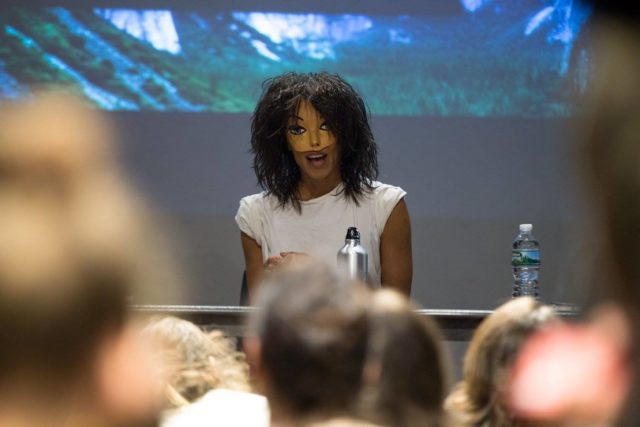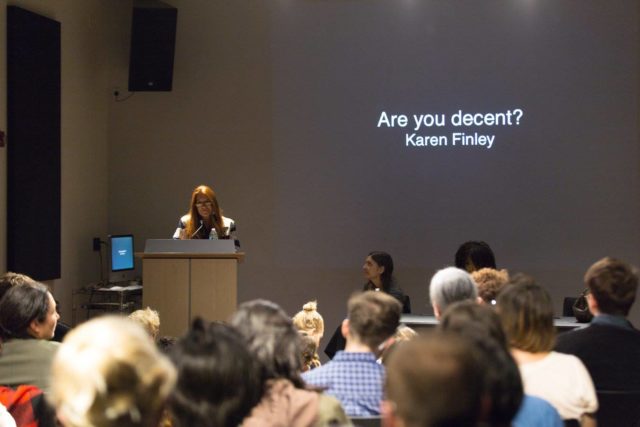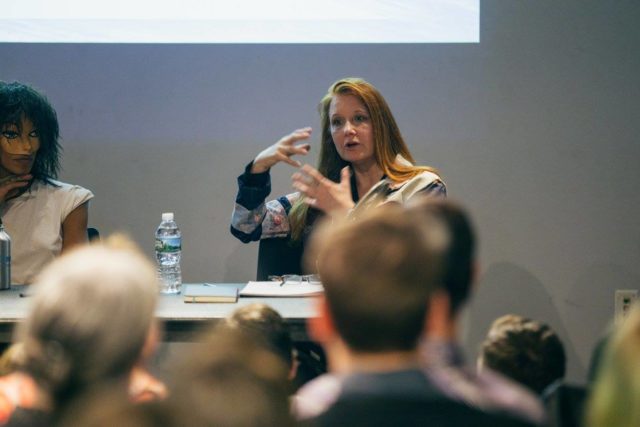
Narcissister speaks in “Baring It: Self-Exposure In Feminist Performance” at NYU’s Performance Studies (photo via Performance Studies @ NYU)
What is it like for a woman artist to self-expose? A roundtable at New York University’s Performance Studies Department last week gave some insider insight into the bravery and vulnerability that explicit feminist performance art requires.
Moderated by Performance Studies Professor Barbara Browning, Baring It: Self-Exposure In Feminist Performance brought together two performance artists of different generations–outspoken stalwart Karen Finley and mannequin-masked Narcissister. The panel was organized in conjunction with the Grey Art Gallery’s exhibition A Feast of Astonishments: Charlotte Moorman and the Avant-Garde, 1960s-1980s. No stranger to public nudity herself, Moorman acted as a historical foremother for the two performers as they delved into their own use of the body.
In front of a packed classroom of more than 50 attendees, each performer presented their art individually. Finley started by screening a video from the early 1990s, which depicted the performer playfully scampering around a modern art museum nude. It appeared more like a Jackass-style home video than a studied performance piece, which only added to its whimsical but illicit air. In one scene, she poses next to a pair of Giacometti sculptures, inserting her own curvaceous body within his angular figures to question, as she noted, “the spaces you are allowed as a woman artist.”

Karen Finley starts her “Are you decent?” presentation (photo via Performance Studies @ NYU)
Much of her presentation dealt with the treatment of women’s bodies. She titled her talk “Are You Decent?” referring to question she received in the late 1990s. Performing in a prestigious theater, the director and producer came to her dressing room, knocked on her door and asked, “Are you decent?” While she received death threats for her show the same night, that seemingly innocuous question stuck with her due to the intimation that if she was nude, she would have been indecent.
This tension between decency and indecency is certainly not an unfamiliar one for Finley who was part of the NEA Four. The NEA Four are a group of performance artists who had their NEA grants revoked for indecency during the Culture Wars in the 1990s. Finley’s court battles raged all the way to the Supreme Court in 1998. While juxtaposing her legal struggles with Charlotte Moorman’s 1967 arrest for public nudity over her performance in Opera Sextronique, Finley stuttered and hesitated. “I have a little PTSD,” she half-joked, looking at a projection of a newspaper discussing her Supreme Court case. That unscripted moment felt like a rare yet significant glimpse into the realities and potential dangers of self-exposure for women artists, particularly coming from Finley who is such an imposing figure in the field.
In her talk, Finley described, “The body is a loaded weapon, which has the power to disrupt.” Narcissister’s presentation only confirmed this statement. Narcissister screened three eye-popping videos, which blurred the boundaries between burlesque, drag and performance art. Take, for example, Every Woman, which is a type of reverse strip tease set to Chaka Khan’s classic “I’m Every Woman.” Narcissister appears nude and gradually puts on clothes that she pulls out of her giant afro wig, mouth, vagina and anus. Narcissister’s body was quite literally loaded.
Appearing at NYU wearing her trademark mask, which is derived from the face on wig display forms, Narcissister, who seemed a bit shy in contrast to her outrageous videos, mostly let her art speak for itself. A trained professional dancer and commercial artist, she explained her use of the mask and pseudonym came from a desire to “perform slippages of identity.” This allows her to take on various racial identities (she is multiracial). It’s also terrifying, which made Finley’s later description of the work as “lovely” completely hilarious.
Even though she left most of the interpretation to the audience, Narcissister’s work features a strong feminist critique of the objectifying gaze. While her message might be hidden under camp shock tactics, her videos such as Every Woman show the object–whether a mannequin or a nude female performer–taking her power back. In Every Woman, this literally meant by clothing herself with garments obtained internally. She also performs a feminine sexuality that is so overblown that it actually becomes unsettling–another means to disrupt her objectification.

Narcissister and Karen Finley discuss (photo via Performance Studies @ NYU)
While these individual presentations were certainly worthwhile, especially for those new to Finley or Narcissister’s art, the roundtable’s question and answer segment was more engaging. On prompting from Browning and various audience members, Finley and Narcissister discussed topics as varied as the misinterpretation of their work, which they both welcome, and the popularity of feminism in current pop culture. “I like Beyoncé!” proudly proclaimed Finley. Narcissister agreed that “Formation” was an anthem, reflecting, “I think there’s a lot of power in pop culture.”
The most compelling question came from a fellow performer in the audience who asked the duo if “they had ever been scared in a performance.” This opened up the possibility of further delving into the vulnerability that creeped into Finley’s initial presentation. Narcissister recalled a recent performance at the Broad Museum. When told the performance would be outside, she assumed that meant an interior courtyard, but instead, it was a public park. “I realized,” she said, “how protected I am by these institutions–galleries, museums and nightclubs. I was afraid of what might happen…afraid of launching it [her art] on unexpected people.”
Finley followed Narcissister’s story with a discussion of her experiences during the Culture Wars. “You feel like you’re illegal,” she explained. But, Finley also significantly pointed out that it’s a privilege to have your work censored. She described, “I’m a white women artist. I wasn’t erased or ignored. I had the possibility to be threatening… I think about those who are silenced.”
After examining the larger institutional threats she has faced throughout her career, Finley then turned the conversation to the personal, admitting her own vulnerability. She concluded, “Every time I perform, I’m afraid.”


Comments on this entry are closed.